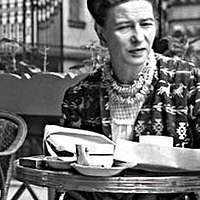Simone de Beauvoir, born January 9, 1908 in Paris, France, was a philosopher, writer and radical feminist who became a key figure in the struggle for women’s rights. Her most influential work, ‘The Second Sex,’ published in 1949, is considered a milestone in the feminist movement and remains relevant today.
De Beauvoir grew up in a bourgeois family, but she refused to conform to the traditional role of women and instead sought an intellectual and creative life. She studied philosophy at the University of Paris and became acquainted with several renowned intellectuals and writers, including Jean-Paul Sartre, who became her lifelong companion.
Beauvoir’s relationship with Sartre was unconventional for its time. Although they never married, they had an open relationship that challenged social norms and broke down traditional gender barriers. Together, they traveled, debated philosophical ideas and promoted equality in all its forms.
‘The Second Sex’ is de Beauvoir’s best-known work and is considered a milestone in feminist thought. In the book, she examines the social construction of gender and argues that women have historically been defined in relation to men, rather than being recognized as autonomous individuals. De Beauvoir argues that women’s oppression is not a natural result, but a social and cultural construct. As such, it can also be undone.
De Beauvoir’s focus on individual freedom and female autonomy was revolutionary in her time. She argued that women should be free to choose their own destiny and not be constrained by societally imposed gender roles and expectations. Her work inspired generations of feminists and laid the groundwork for the women’s liberation movement in the decades that followed.
Simone de Beauvoir’s legacy endures as one of the most influential voices in the fight for gender equality. Through her philosophy and writing, De Beauvoir left an enduring legacy that continues to inspire and motivate people to strive for a more just and equal world.


